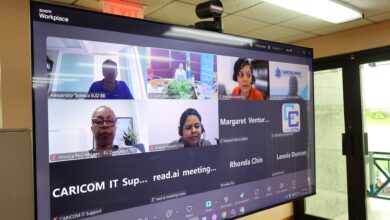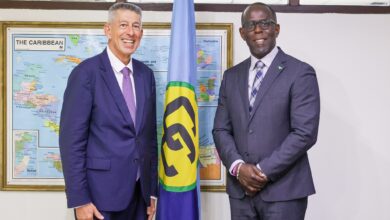(CARICOM Secretariat, Turkeyen, Greater Georgetown, Guyana) The Region’s Chief Medical Officers (CMOs) are devising a Port Health protocol for the Influenza A H1N1 virus which will be presented to Caribbean Community (CARICOM) Heads of Government at their Thirtieth Meeting scheduled for 2-5 July in Guyana.
CARICOM public health officials believe that countries need to be extremely cautious in dealing with the Influenza A H1N1 virus, commonly know as Swine Flu, and are drawing up the protocol out of an abundance of caution.
The officials are concerned about the affect of the H1N1 virus on the vital foreign exchange earning tourism sector. Programme Manager for Health Sector Development at the CARICOM Secretariat, Dr. Rudolph Cummings said when the CMOs recently met in an emergency session they did so with the intention of devising protocols for dealing with tourists moving across the Region by sea. He pointed to the case of cruise ship passengers who had shown symptoms of the virus and who were denied entry in Barbados, Grenada and Saint Lucia.
”So many of our countries in the Region are heavily dependent on tourism, including cruise ship passengers and this poses some challenges in dealing with the H1N1 Virus,” said Dr. Cummings. ‘We wouldn’t want to take action that may ultimately damage our economies.”
“Cruise ship passengers move across multiple countries on a single voyage. In our Region the issue of the capacity of public health system to deal with a single patient requiring intensive care comes into play when one considers that large number of persons cruise ships are known to carry,” said Dr. Cummings.
He added that given the ease of spread of the virus, the CMOs also agreed to examine common protocols for dealing with airline passengers as well.
He said the countries need to be mindful of the internationally agreed protocols, as set by the World Health organisation (WHO) to deal with the H1N1 Virus. He cautioned against over reaction which could lead to persons bringing the public health system to a standstill.
Dr. Cummings added that the CMOs will continue to follow the Region wide procedures that were agreed to at the 18th Meeting of the Council for Human and Social Development (COHSOD) which was held in early May.
At this meeting a report delivered by the Caribbean Epidemiology Centre (CAREC) pointed to some initial challenges confronting the regional health sector in monitoring this virus. Those included limited human resource capacity, procurement of supplies, lack of reserves, specimen transfer and specimen contamination.
Against this background, the COHSOD agreed that more vigorous efforts should be made to update existing national plans to a state of ‘readiness’ to strengthen surveillance, and under the guidance of the Caucus of Ministers of Health and in consultation with the Pan American Health Organization (PAHO) to establish and sustain a more effective and efficient Caribbean Laboratory Network.
To this end therefore, CAREC and the collaborating centre at the University of the West Indies, Mona were designated as two reference laboratory facilities fully equipped to do the confirmatory testing required for identifying the type of influenza virus. It was further agreed that once initial cases had been detected that the surveillance should move towards monitoring severe acute respiratory infection. Less severe cases would then be defined by history of association.
Further regional collaboration would be done with the Institut Pasteur, the world-famous French biomedical research organization which focuses on the prevention and treatment of disease worldwide.





